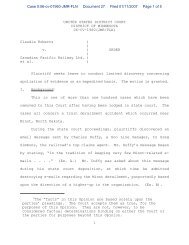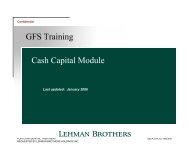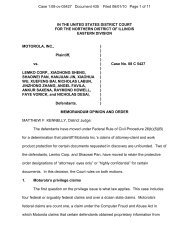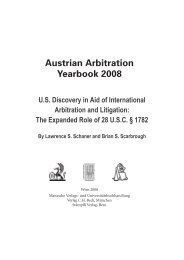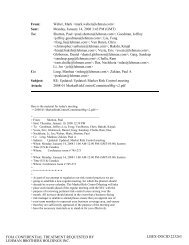"Who Owns the IP Rights to High School Sports ... - Jenner & Block
"Who Owns the IP Rights to High School Sports ... - Jenner & Block
"Who Owns the IP Rights to High School Sports ... - Jenner & Block
Create successful ePaper yourself
Turn your PDF publications into a flip-book with our unique Google optimized e-Paper software.
July 2008, vol. 48, no. 1<br />
There has been a growing trend<br />
in <strong>the</strong> last few years <strong>to</strong> exploit<br />
<strong>the</strong> Internet as a secondary<br />
marketplace. For example, if you miss<br />
an episode of your favorite television<br />
show, you can probably download<br />
it for a fee a few days later on <strong>the</strong><br />
Internet. Or if you are looking for a<br />
discontinued Halloween costume for<br />
your child, someone is likely selling it<br />
on <strong>the</strong> Internet. The secondary market<br />
has grown such that revenue from it<br />
was a major sticking point between<br />
Hollywood writers and producers that<br />
resulted in a recent work s<strong>to</strong>ppage<br />
The newsletter of <strong>the</strong> ISBA’s Section on Intellectual Property Law<br />
Intellectual ProPerty<br />
<strong>Who</strong> owns <strong>the</strong> <strong>IP</strong> rights <strong>to</strong> high<br />
school sports?<br />
By Joseph A. Saltiel, jsaltiel@jenner.com; <strong>Jenner</strong> & <strong>Block</strong> LLP, Chicago; Copyright © Joseph A. Saltiel 2008. All <strong>Rights</strong> Reserved. 1<br />
In thIs Issue<br />
• <strong>Who</strong> owns <strong>the</strong> <strong>IP</strong> rights <strong>to</strong><br />
high school sports?<br />
• sports Figures Reclaim and<br />
Protect <strong>the</strong>ir names (but<br />
Larry Bird really did sleep<br />
here!)<br />
• <strong>the</strong> application of <strong>the</strong><br />
Communications Decency<br />
Act’s <strong>IP</strong> exception <strong>to</strong> state<br />
law claims<br />
• “Guitar hero” – Do <strong>the</strong> claims<br />
catch more than just air?<br />
<strong>the</strong> patent license fights<br />
surrounding a popular video<br />
game<br />
......<br />
......<br />
......<br />
......<br />
1<br />
4<br />
5<br />
8<br />
forcing television stations <strong>to</strong> run only<br />
re-runs and reality shows. Now that <strong>the</strong><br />
writers and producers are in agreement,<br />
<strong>the</strong> battleground has moved from Los<br />
Angeles <strong>to</strong> Peoria. So when you missed<br />
your son scoring a <strong>to</strong>uchdown in his<br />
state championship game this past<br />
November, <strong>the</strong> question is not whe<strong>the</strong>r<br />
you can relive <strong>the</strong> moment by purchasing<br />
pho<strong>to</strong>graphs of it on <strong>the</strong> Internet, it<br />
is who is going <strong>to</strong> sell you those pho<strong>to</strong>graphs.<br />
The Legal Dispute:<br />
The Illinois <strong>High</strong> <strong>School</strong> Association<br />
(“IHSA”) is an unincorporated association<br />
of over 750 public and private high<br />
schools in Illinois. 2 Starting in 2001,<br />
<strong>the</strong> IHSA, after soliciting bids, entered<br />
in<strong>to</strong> an agreement with Visual Image<br />
Pho<strong>to</strong>graphy (“V<strong>IP</strong>”) <strong>to</strong> provide pho<strong>to</strong>graphy<br />
services at various IHSA events, 3<br />
including images featuring player<br />
action, crowd features, sportsmanship,<br />
<strong>to</strong>urnament officials, IHSA personnel,<br />
sponsors, award presentations, etc. 4 In<br />
exchange for awarding pho<strong>to</strong>graphic<br />
exclusivity <strong>to</strong> V<strong>IP</strong>, which included<br />
prohibiting o<strong>the</strong>r pho<strong>to</strong>graphers who<br />
intend <strong>to</strong> sell <strong>the</strong>ir pho<strong>to</strong>graphs from<br />
pho<strong>to</strong>graphing IHSA State Finals, <strong>the</strong><br />
IHSA was allowed <strong>to</strong> use <strong>the</strong> pho<strong>to</strong>graphs<br />
captured by V<strong>IP</strong> in various publications<br />
for promoting <strong>the</strong> activities of<br />
<strong>the</strong> IHSA, its member schools, and stu-<br />
Reprinted with permission of <strong>the</strong> Illinois State Bar Association<br />
dent participants. 5 The IHSA estimates<br />
that this agreement saved <strong>the</strong> IHSA over<br />
$50,000 a year in pho<strong>to</strong>graphy-related<br />
services. 6<br />
Although <strong>the</strong> IHSA has had an<br />
agreement with V<strong>IP</strong> for several years,<br />
<strong>the</strong> IHSA did not proactively prohibit<br />
<strong>the</strong> media from selling its pho<strong>to</strong>graphs<br />
of IHSA events. 7 In 2007, however,<br />
<strong>the</strong> IHSA distributed <strong>to</strong> <strong>the</strong> media its<br />
2007-08 Football State Final Media<br />
Arrangements, which expressly prohibited<br />
any secondary use of pho<strong>to</strong>graphs,<br />
such as sales on <strong>the</strong> Internet, without<br />
<strong>the</strong> prior written approval of <strong>the</strong> IHSA.8<br />
In August of 2007, representatives of<br />
<strong>the</strong> Illinois Press Association (“<strong>IP</strong>A”)<br />
met with <strong>the</strong> IHSA <strong>to</strong> discuss <strong>the</strong> “new”<br />
media arrangement. After being unable<br />
<strong>to</strong> reach any agreement regarding <strong>the</strong><br />
secondary uses of pho<strong>to</strong>graphs by <strong>the</strong><br />
media, <strong>the</strong> <strong>IP</strong>A filed a lawsuit in <strong>the</strong><br />
Circuit Court of <strong>the</strong> Seventh Judicial<br />
Circuit of Illinois on November 1, 2007.<br />
Illinois Press Association v. Illinois <strong>High</strong><br />
<strong>School</strong> Association, Case No. 07-CH-<br />
885.<br />
The <strong>IP</strong>A was seeking an injunction<br />
prohibiting <strong>the</strong> IHSA from enforcing<br />
its policies on secondary use and from<br />
allowing V<strong>IP</strong> <strong>to</strong> have greater access<br />
than o<strong>the</strong>r pho<strong>to</strong>graphers at IHSA<br />
events. After filing its complaint, <strong>the</strong> <strong>IP</strong>A<br />
immediately filed a motion for a temporary<br />
restraining order against <strong>the</strong> IHSA,
which Judge Patrick Kelley denied on<br />
November 5, 2007. The IHSA responded<br />
<strong>to</strong> <strong>IP</strong>A’s complaint by filing counterclaims<br />
and a motion for a preliminary<br />
injunction enjoining <strong>the</strong> <strong>IP</strong>A and its<br />
members from selling pho<strong>to</strong>graphs of<br />
IHSA events in violation of <strong>the</strong> IHSA’s<br />
policies that are listed on media credentials<br />
and event tickets. Before Judge<br />
Kelley made any substantive rulings,<br />
<strong>the</strong> parties filed a stipulation <strong>to</strong> dismiss,<br />
which <strong>the</strong> court signed on April 9, 2008<br />
ending <strong>the</strong> dispute.<br />
The Public Dispute:<br />
While <strong>the</strong> at<strong>to</strong>rneys battled in<br />
<strong>the</strong> courtroom, <strong>the</strong> parties battled in<br />
<strong>the</strong> court of public opinion. In late<br />
November of 2007, <strong>the</strong> IHSA denied<br />
several media pho<strong>to</strong>graphers entry <strong>to</strong><br />
<strong>the</strong> IHSA Football State Finals because<br />
<strong>the</strong>y refused <strong>to</strong> adhere <strong>to</strong> <strong>the</strong> IHSA’s<br />
secondary use prohibition. 9<br />
The newspapers quickly shot back.<br />
Some newspapers had <strong>the</strong>ir pho<strong>to</strong>graphers<br />
purchase tickets <strong>to</strong> events so <strong>the</strong>y<br />
could take pictures from <strong>the</strong> stands. 10<br />
The newspapers also published articles<br />
and commentary highlighting <strong>the</strong> issue<br />
for <strong>the</strong> public, including “apologies” <strong>to</strong><br />
its readers for not being able <strong>to</strong> publish<br />
pho<strong>to</strong>graphs from certain IHSA State<br />
Finals because of <strong>the</strong> IHSA’s policies.<br />
Given <strong>the</strong> media spotlight, <strong>the</strong>re was<br />
a substantial public backlash against<br />
<strong>the</strong> IHSA, or at least enough of a backlash<br />
<strong>to</strong> peak <strong>the</strong> interest of lawmakers.<br />
The Illinois State Legislature drafted proposed<br />
legislation prohibiting <strong>the</strong> IHSA<br />
from imposing its secondary use policy.<br />
In response, <strong>the</strong> IHSA first tried <strong>to</strong> soften<br />
its policy saying that it would allow <strong>the</strong><br />
media <strong>to</strong> distribute pho<strong>to</strong>graphs on <strong>the</strong><br />
Internet and <strong>to</strong> <strong>the</strong> community as long<br />
as <strong>the</strong> pho<strong>to</strong>graphs were not being sold.<br />
That policy did not work for <strong>the</strong> IHSA<br />
Girls Gymnastics and Wrestling State<br />
Finals in mid-February because <strong>the</strong><br />
media pressure and public outcry only<br />
intensified after <strong>the</strong> media, <strong>to</strong> gain entry<br />
in<strong>to</strong> those events, was still required <strong>to</strong><br />
sign waivers promising <strong>to</strong> adhere <strong>to</strong> <strong>the</strong><br />
IHSA’s prohibition on secondary uses<br />
of pho<strong>to</strong>graphs taken at those events.<br />
Thus, <strong>the</strong> legislature continued <strong>to</strong> move<br />
forward with its proposed legislation.<br />
By <strong>the</strong> end of February 2008, <strong>the</strong> IHSA<br />
relented and temporarily lifted any<br />
restrictions on <strong>the</strong> media for <strong>the</strong> IHSA<br />
Girls Basketball Finals.<br />
Regardless of <strong>the</strong> IHSA’s relaxed<br />
policies, <strong>the</strong> Senate passed legisla-<br />
Intellectual Property<br />
tion banning <strong>the</strong> IHSA’s secondary use<br />
policies. While <strong>the</strong> media’s secondary<br />
use of pho<strong>to</strong>graphs was problematic<br />
for <strong>the</strong> HSA, <strong>the</strong> proposed legislature<br />
was even worse. The IHSA feared that<br />
<strong>the</strong> proposed legislation would have a<br />
broad impact on <strong>the</strong> IHSA and its member<br />
schools, affecting everything from<br />
yearbooks <strong>to</strong> television rights. 11 Hence,<br />
before <strong>the</strong> House could approve <strong>the</strong><br />
Senate’s legislation, <strong>the</strong> IHSA relented.<br />
In early April 2008, <strong>the</strong> IHSA settled its<br />
dispute with <strong>the</strong> <strong>IP</strong>A allowing <strong>the</strong> media<br />
unrestricted access <strong>to</strong> IHSA championship<br />
events, mooting <strong>the</strong> pending legislation.<br />
12<br />
The Legal Issues:<br />
The IHSA’s legal argument was<br />
two-fold. First, <strong>the</strong> IHSA argued that it<br />
had <strong>the</strong> unrestricted right <strong>to</strong> enter in<strong>to</strong><br />
contracts. For this proposition, <strong>the</strong> IHSA<br />
relied primarily on Coyne-Delany Co.<br />
v. Capital Dev. Bd., where <strong>the</strong> Seventh<br />
Circuit conveyed its belief that a state<br />
government, just as <strong>the</strong> federal government,<br />
has broad freedom <strong>to</strong> deal with<br />
whom it chooses on <strong>the</strong> terms it chooses.<br />
13 616 F.2d 341, 342 (7th Cir. 1980).<br />
Second, <strong>the</strong> IHSA argued that it<br />
could restrict or limit access <strong>to</strong> people<br />
for <strong>the</strong> purposes of performing under<br />
those contracts. Although <strong>the</strong> IHSA did<br />
not cite a case directly on point, it did<br />
rely heavily on Fo<strong>to</strong> USA, Inc. v. Bd.<br />
Of Regents of <strong>the</strong> Univ. Sys. Of Florida,<br />
141 F.3d 1032 (11th Cir. 1998). In Fo<strong>to</strong>,<br />
certain state universities solicited bids<br />
from pho<strong>to</strong>graphers <strong>to</strong> enter in<strong>to</strong> contracts<br />
<strong>to</strong> be <strong>the</strong> exclusive pho<strong>to</strong>grapher<br />
at <strong>the</strong>ir graduations. Id. at 1034. After<br />
entering in<strong>to</strong> a contract, <strong>the</strong> universities<br />
prohibited any o<strong>the</strong>r pho<strong>to</strong>grapher from<br />
taking pho<strong>to</strong>graphs of <strong>the</strong>ir graduation<br />
ceremonies for commercial purposes. A<br />
pho<strong>to</strong>grapher who was prohibited from<br />
taking pho<strong>to</strong>graphs for commercial purposes<br />
at a graduation brought suit seeking<br />
an injunction against <strong>the</strong> universities<br />
from violating his First Amendment<br />
rights. The Eleventh Circuit, affirming<br />
summary judgment for <strong>the</strong> universities,<br />
held that <strong>the</strong> First Amendment was not<br />
implicated by a pho<strong>to</strong>grapher seeking<br />
commercial access <strong>to</strong> memorialize a<br />
public event especially because, in that<br />
case, <strong>the</strong> pho<strong>to</strong>grapher had an opportunity<br />
<strong>to</strong> bid and become <strong>the</strong> official<br />
pho<strong>to</strong>grapher.<br />
Fo<strong>to</strong>, however, is easily distinguishable.<br />
First, a graduation ceremony,<br />
where rarely anyone o<strong>the</strong>r than family<br />
Reprinted with permission of <strong>the</strong> Illinois State Bar Association<br />
and friends are interested and often<br />
times is not open <strong>to</strong> <strong>the</strong> public, is<br />
quite different from playoffs or a state<br />
championship game, which is open<br />
<strong>to</strong> <strong>the</strong> public and where <strong>the</strong> public is<br />
interested. Second, although <strong>the</strong> media<br />
is selling pho<strong>to</strong>graphs for commercial<br />
gain, <strong>the</strong> media also has a legitimate<br />
non-commercial interest in ga<strong>the</strong>ring<br />
and reporting <strong>the</strong> news. Third, <strong>the</strong><br />
media was not, and could not, be part<br />
of <strong>the</strong> bid selection process used by <strong>the</strong><br />
IHSA <strong>to</strong> select its pho<strong>to</strong>graphers.<br />
The <strong>IP</strong>A also <strong>to</strong>ok a two-fold<br />
approach, but framed <strong>the</strong> issue differently.<br />
First, relying on previous Illinois<br />
court cases holding <strong>the</strong> IHSA <strong>to</strong> be a<br />
state ac<strong>to</strong>r because of its membership’s<br />
overwhelming public nature, <strong>the</strong> <strong>IP</strong>A<br />
argued that <strong>the</strong> actions of <strong>the</strong> IHSA<br />
were bound by constitutional guarantees.<br />
Thus, <strong>the</strong> IHSA’s prohibition on<br />
secondary use was a violation of article<br />
1, section 4 of <strong>the</strong> Illinois Constitution<br />
(which <strong>the</strong> <strong>IP</strong>A concedes is traditionally<br />
afforded <strong>the</strong> same protection as <strong>the</strong> First<br />
Amendment), i.e., a violation of <strong>the</strong><br />
<strong>IP</strong>A’s freedom of speech and freedom<br />
of press, and subject <strong>to</strong> a strict scrutiny<br />
analysis. The <strong>IP</strong>A argued that <strong>the</strong> IHSA’s<br />
rule failed this analysis because <strong>the</strong>re<br />
was no compelling governmental interest<br />
served by <strong>the</strong> prohibition. The <strong>IP</strong>A<br />
also argued <strong>the</strong> prohibition was not<br />
narrowly tailored because “secondary<br />
use” was not clearly defined. (In<br />
<strong>the</strong> alternative, <strong>the</strong> <strong>IP</strong>A argued that if<br />
<strong>the</strong> lesser intermediate standard was<br />
applied it would also prevail for <strong>the</strong><br />
same reasons).<br />
Second, <strong>the</strong> <strong>IP</strong>A argued that <strong>the</strong><br />
IHSA’s prohibition on secondary use<br />
was a violation of <strong>the</strong> equal protection<br />
clause. For this argument, <strong>the</strong><br />
<strong>IP</strong>A relied on Chicago Tribune Co.<br />
v. Village of Downers Grove, 125<br />
Ill.2d 468, 532 N.E.2d 821, 126 Ill.<br />
Dec. 950 (1988). There, <strong>the</strong> village of<br />
Downers Grove passed an ordinance<br />
that imposed greater restrictions on<br />
commercial door-<strong>to</strong>-door solicitations<br />
than non-commercial solicitations. The<br />
Illinois Supreme Court struck down <strong>the</strong><br />
ordinance on free speech and equal<br />
protection grounds because it hindered<br />
<strong>the</strong> ability of Chicago Tribune <strong>to</strong> advertise<br />
its newspaper while allowing, for<br />
example, not-for-profit organizations <strong>to</strong><br />
advertise unfettered.<br />
Like <strong>the</strong> IHSA, <strong>the</strong> <strong>IP</strong>A’s position was<br />
not without its weaknesses. Chicago<br />
Tribune is distinguishable because V<strong>IP</strong><br />
Vol. 48, No. 1, July 008
is not a media organization. All media<br />
at IHSA events were treated equally.<br />
The <strong>IP</strong>A’s first amendment position was<br />
also suspect. The IHSA did not prohibit<br />
<strong>the</strong> media from attending events and<br />
disseminating <strong>the</strong> news. Nor did <strong>the</strong><br />
IHSA prohibit <strong>the</strong> media from using<br />
pho<strong>to</strong>graphs as part of that dissemination<br />
of news. The IHSA’s policies only<br />
targeted <strong>the</strong> media’s secondary use of<br />
pho<strong>to</strong>graphs, which was a use for pure<br />
commercial gain.<br />
The Solution:<br />
Both <strong>the</strong> <strong>IP</strong>A and IHSA approached<br />
this issue from different areas of<br />
<strong>the</strong> law. Unfortunately, nei<strong>the</strong>r side<br />
addressed <strong>the</strong> real issue: <strong>Who</strong> owns<br />
<strong>the</strong> intellectual property rights <strong>to</strong> high<br />
school athletics? The most likely reason<br />
nei<strong>the</strong>r side addressed <strong>the</strong> issue was<br />
because <strong>the</strong>re is no statute or case law<br />
on point. In o<strong>the</strong>r words, this exact<br />
issue does not appear <strong>to</strong> have been litigated<br />
or legislated.<br />
The answer may have profound<br />
effects on how far <strong>the</strong> government can<br />
control o<strong>the</strong>rwise public events. Ei<strong>the</strong>r<br />
parties’ position taken <strong>to</strong> its logical<br />
conclusion would result in <strong>the</strong> absurd:<br />
a city owning all <strong>the</strong> intellectual property<br />
rights <strong>to</strong> any public function within<br />
its city limits or <strong>the</strong> converse, <strong>the</strong> media<br />
being allowed <strong>to</strong> use any public activity<br />
for commercial gain. The answer<br />
should lie somewhere in between.<br />
Although secondary use issues have<br />
been known for some time, <strong>the</strong> secondary<br />
use market on <strong>the</strong> Internet, which<br />
is a relatively new phenomenon, has<br />
made this issue much more prevalent<br />
than in years past. Many o<strong>the</strong>r state<br />
athletic associations have <strong>the</strong> same<br />
problem as <strong>the</strong> IHSA, but <strong>the</strong> associations<br />
in o<strong>the</strong>r states have not reached<br />
<strong>the</strong> point of <strong>the</strong> parties in Illinois. Thus,<br />
<strong>the</strong> suit between <strong>the</strong> <strong>IP</strong>A and IHSA<br />
appeared <strong>to</strong> be <strong>the</strong> first of its kind; as<br />
was <strong>the</strong> legislation pending before <strong>the</strong><br />
Illinois legisla<strong>to</strong>r. Unfortunately, both<br />
<strong>the</strong> suit and <strong>the</strong> legislation died before<br />
providing a solution or any guidance.<br />
The real issue here is an intellectual<br />
property issue, which is largely<br />
<strong>the</strong> domain of federal laws, shaped by<br />
public policy. A state statute addressing<br />
secondary use, such as <strong>the</strong> proposed<br />
Illinois statute, might not end <strong>the</strong> controversy<br />
because such a state statute<br />
has <strong>the</strong> potential of being preempted<br />
by federal law. See, e.g., 17 U.S.C. §<br />
301 of <strong>the</strong> Copyright Act. A real solu-<br />
Vol. 48, No. 1, July 008<br />
Intellectual Property<br />
tion will have <strong>to</strong> carefully balance<br />
several different types of constitutional<br />
rights. In a perfect world, Congress<br />
would step in and legislate a clear and<br />
wise answer, but since that is unlikely<br />
<strong>to</strong> happen anytime soon, we may have<br />
<strong>to</strong> wait for <strong>the</strong> courts <strong>to</strong> provide an<br />
answer, or at <strong>the</strong> very least, some guidance.<br />
__________<br />
1. Joseph A. Saltiel and Amy L. Signaigo<br />
are at<strong>to</strong>rneys in <strong>the</strong> intellectual property<br />
department at <strong>Jenner</strong> & <strong>Block</strong> LLP. Amy<br />
Signaigo assisted with <strong>the</strong> research for this<br />
article. The views and opinion expressed<br />
here are those of <strong>the</strong> author and not <strong>Jenner</strong><br />
& <strong>Block</strong> LLP.<br />
2. Defendant/Counterclaim-Plaintiff and<br />
Third-Party Plaintiff IHSA’s Verified Mot. for<br />
Preliminary Injunction at 2.<br />
3. Most high schools are members of<br />
<strong>the</strong> IHSA. The IHSA regulates competitions<br />
between its member schools, including<br />
season ending <strong>to</strong>urnaments and playoffs.<br />
The season ending <strong>to</strong>urnaments and playoffs<br />
are widely publicized and, hence, more<br />
commercial <strong>the</strong>n most “regular” season<br />
competitions.<br />
4. Id. at 3.<br />
5. Id. at 2-3.<br />
6. Id. at 3.<br />
7. Amended Complaint, ¶ 9.<br />
8. Id., ¶ 10.<br />
9. 11/23/07 IHSA Announcement.<br />
10. Defendant/Counterclaim-Plaintiff<br />
and Third-Party Plaintiff IHSA’s Verified Mot.<br />
for Preliminary Injunction at 5.<br />
11. 2/12/08 IHSA Announcement.<br />
12. Sut<strong>to</strong>n, Allen, “IHSA, press association<br />
reach deal,” Chicago Tribune, April 9,<br />
2008, Sec. 4, pg. 9.<br />
13. The IHSA is not a government entity.<br />
Interestingly, however, <strong>the</strong> IHSA did not<br />
rebut <strong>the</strong> <strong>IP</strong>A’s allegation that <strong>the</strong> IHSA is an<br />
arm of <strong>the</strong> state for Fourteenth Amendment<br />
purposes.<br />
Reprinted with permission of <strong>the</strong> Illinois State Bar Association<br />
Intellectual<br />
Property<br />
Published at least four times per year.<br />
Annual subscription rate for ISBA<br />
members: $20.<br />
To subscribe, visit www.isba.org or<br />
call (217)525-1760<br />
OFFICE<br />
Illinois Bar Center<br />
424 S. 2nd Street<br />
Springfield, IL 62701<br />
Phones: (217) 525-1760<br />
OR 800-252-8908<br />
Web site: www.isba.org<br />
Edi<strong>to</strong>r<br />
Daniel Kegan<br />
79 W. Monroe St., Ste. 1320<br />
Chicago, IL 60603-4969<br />
Reginald J. Hill<br />
One IBM Plaza<br />
Chicago, IL 60611<br />
Managing Edi<strong>to</strong>r/Production<br />
Katie Underwood<br />
kunderwood@isba.org<br />
Intellectual Property Section<br />
Council<br />
Eugene F. Friedman, Chair<br />
Joseph T. Nabor, Vice Chair<br />
Kristin L. Lingren, Secretary<br />
Stephen G. Kehoe, Ex-Officio<br />
Dennis C. Garcia<br />
Theresa V. Johnson<br />
Dale R. Kurth<br />
Charles L. Mudd<br />
Scott B. Sievers<br />
Alan R. Single<strong>to</strong>n<br />
Eric R. Waltmire<br />
Carl R. Draper, Board Liaison<br />
Steven L. Baron, CLE Coordina<strong>to</strong>r<br />
Selina S. Thomas, Staff Liaison<br />
Disclaimer: This newsletter is for subscribers’ personal<br />
use only; redistribution is prohibited. Copyright Illinois<br />
State Bar Association. Statements or expressions of<br />
opinion appearing herein are those of <strong>the</strong> authors and<br />
not necessarily those of <strong>the</strong> Association or Edi<strong>to</strong>rs, and<br />
likewise <strong>the</strong> publication of any advertisement is not <strong>to</strong><br />
be construed as an endorsement of <strong>the</strong> product or service<br />
offered unless it is specifically stated in <strong>the</strong> ad that<br />
<strong>the</strong>re is such approval or endorsement.<br />
Articles are prepared as an educational service <strong>to</strong> members<br />
of ISBA. They should not be relied upon as a substitute<br />
for individual legal research.<br />
The articles in this newsletter are not intended <strong>to</strong> be used<br />
and may not be relied on for penalty avoidance.<br />
Postmaster: Please send address changes <strong>to</strong> <strong>the</strong> Illinois<br />
State Bar Association, 424 S. 2nd St., Springfield, IL<br />
62701-1779.



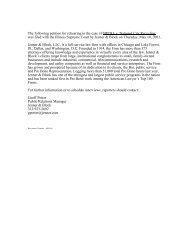

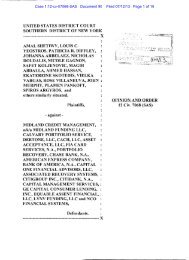
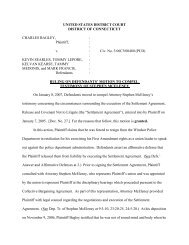

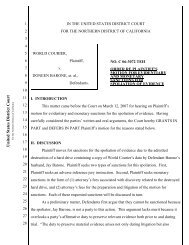
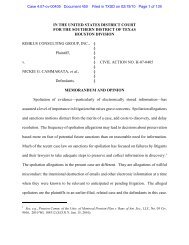
![Fontana, Thomas [CMB-RISK] [tf09146@imcnam.ssmb.com]](https://img.yumpu.com/14900567/1/190x245/fontana-thomas-cmb-risk-tf09146imcnamssmbcom.jpg?quality=85)
